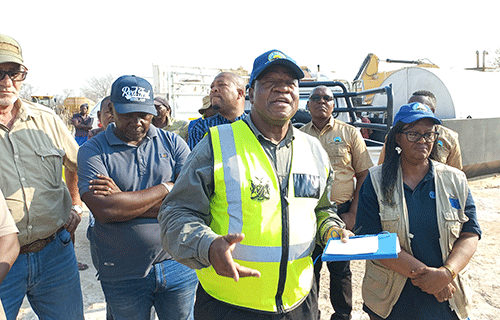Works and Transport minister John Mutorwa said his ministry, through the Roads Authority (RA), has resorted to the construction of roads in phases to ensure that in every region, there are some activities taking place.
This is to ensure that they work on many projects in all corners of the country, as opposed to doing one major project in one region while other regions’ projects are on hold due to a lack of funds.
“Now, I must also explain the issue of fairness, and that’s why we do not believe in this thing of concentrating on one region until all the roads there are finished, and then you move to the next one. It doesn’t work that way,” he emphasised recently during the groundbreaking of the Nkurenkuru-Nepara road, which will now be upgraded to a tarred road.
The project will be executed in two phases at a total cost of N$29.9 million, of which phase one will be done in 10 months and cover the first 10km of the 28km stretch. Phase two will comprise the last 18km.
“The main reason is not the political will; it’s mainly the financial resources. I also don’t agree with the officials if they come to me and say ‘We don’t have the full amount, therefore we cannot start’. I don’t agree with that. The best is like we do in our own homes, start with phase one, but when you are implementing phase one, you must already plan that in your next budget, there is something to continue with the second phase,” he advised.
Mutorwa said constructing roads in phases is exactly what they are doing with the Epukiro road, which will eventually go up to Eiseb Block.
“That’s what we will also do with the Gam, Tsumkwe, Shikerete, Khaudum and Ndiyona roads. Plans must be there, and put in some money, because we must bring hope to each and every region of Namibia. Hope cannot be established through talking alone; people must see that at least something is happening. That is why we are doing things that way,” Mutorwa reiterated.
He emphasised that the upgrading of projects countrywide symbolises government’s dedication to the welfare of people and the prosperity of all the regions.
The minister furthermore urged the RA to distribute their strategic business plan to leaders at all levels to ensure they understand what projects are planned in their area, and to assist leaders correctly who may be talking about their areas being neglected.
“We do not just wake up and decide that we are going to construct a road at place number B or C. This is our menu; the roads menu from 2023 to 2027. I’m directing this to the management of the Roads Authority that this document must be distributed as far as possible throughout the Republic of Namibia because it is the summary of all planned roads that the RA must undertake when there’s an availability of funds,” he continued. Mutorwa also highlighted the government’s policy on recruiting labourers at road construction projects.
“For manual work, we look at locals. Local really means if the road is here, people who live here and in the surrounding areas who are Namibians, are the local people.
But we also have problems with tribalism, maybe not so much here, but in other areas where some people are inventing terms like the ‘original people’ who were here. That is not the idea, but people who have lived near the project in that area for quite some time, are locals,” he stated.
“I emphasise Namibians because there’s no region where you get 100% one tribe or one language. But of course, you must also be sensitive about the majority of people who are there, and the local leadership must help the contractors to identify locals who can be employed at a project as labourers to improve their livelihoods while the project is being executed in their area,” Mutorwa continued.
– jmuyamba@nepc.com.na



